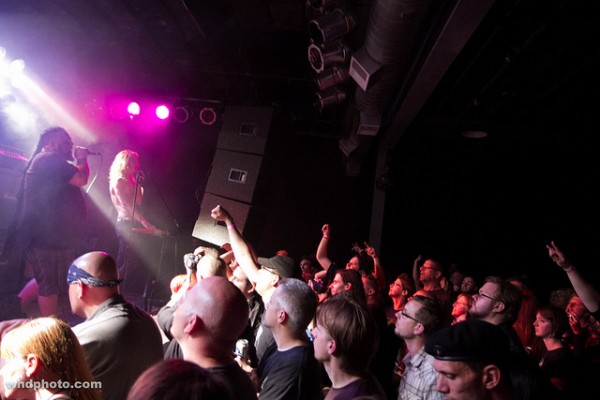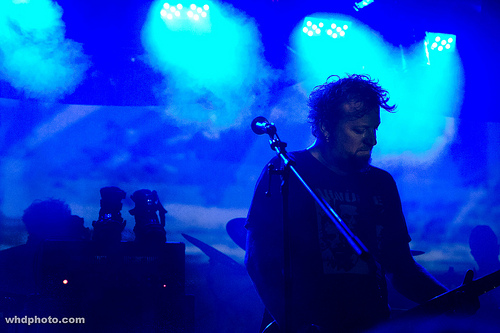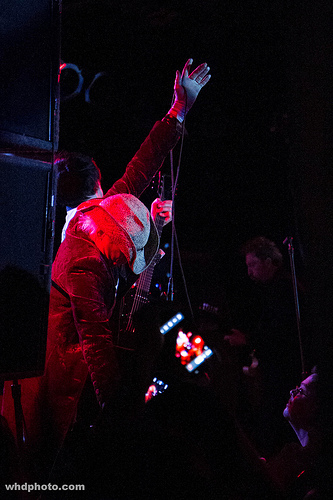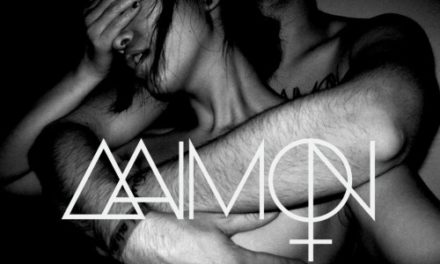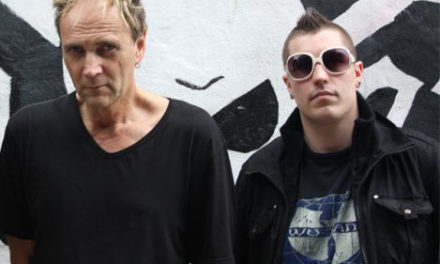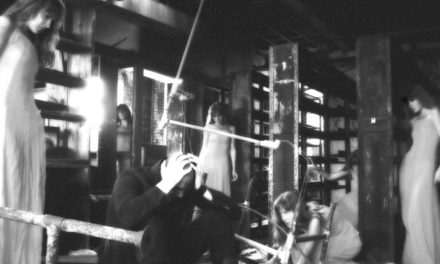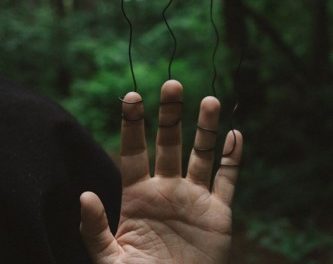“We each still have days where it is tough to come to terms with what happened but we also recognize all of the good that came out of such a tragedy.”
Last year, following the untimely passing of one of Chicago industrial’s prodigal sons, Jamie Duffy of Acumen Nation and DJ? Acucrack, a one-night commemoration of his life and contributions to music was created in the form of Cold Waves: A Jamie Duffy Memorial Concert. Taking place at the Bottom Lounge just outside of the Chicago Loop, the concert sold the venue out, displayed a staggering lineup straight out of the annals of industrial music legend, and brought together an international family under one roof to celebrate the life and times of a man who existed for music until he last drew breath. This year, the concert has been reintroduced as a full-fledged festival, spanning two days at a larger venue and featuring fourteen bands, both young and old. We caught up with festival organizers Jason Novak (of Acumen Nation/DJ? Acucrack) and David Schock (of WTII Records) to talk about memories of last year, the trials and tribulations of expanding the event to a two-day affair, and the future of the event as well as industrial as a genre.
ID:UD: Obviously the first Cold Waves was a bittersweet event to organize. Is it emotionally easier this time around since time has gone by since Jamie’s passing?
Jason Novak: Hard to say, because there is so much more time to dwell on things this time around. Last year there was such a small window and everything that summer was kind of done in a daze anyway. This time there is more time to plan and build and contemplate. But obviously time heals all wounds so yes, a bit less emotional.
David Schock: The first Cold Waves festival was basically put together because we realized that people (not just all of his close friends and family) needed an outlet from all of the pain, confusion, and emotional burdens that they might have been feeling with Jamie’s passing. It was an idea that came together very quickly and one that had less than about 8 weeks to put together. I think we can all agree that music has the power to heal wounds and the first Cold Waves festival was just something that had to be done for everyone’s sake. You asked if it is emotionally easier this time around? Well, yes and no. We each still have days where it is tough to come to terms with what happened but we also recognize all of the good that came out of such a tragedy. Not just the reuniting of old friends, new collaborations, new albums and such, but also the idea that if we can help just one person avoid going down the dark path of suicide then all of the stress, cost and time of putting together another festival is well worth it to us.
ID:UD: How did it feel to have the first Cold Waves sell out?
JN: That night I was actually concerned for people I knew who wanted to buy at the door more than anything! And during the event it felt like such a marathon that by the time we hit the stage my first thought was to thank the people that showed up early and were still in their spots. But let’s face it, industrial shows at a certain level are moderately attended affairs, so this was exciting as hell. I kept reminding everyone who rarely plays out anymore to soak in that crowd and try to enjoy it…and was personally very grateful to everyone who packed the place.
DS: The thought that we sold out the first Cold Waves event is incredible to us. The response, energy and outpouring was more than any of us could have imagined. Even though I had booked almost 100 shows now, that event was the largest (and most important) show I had even been a part of. It is not surprising, though, that Jamie touched so many people’s lives, and the fact that people came in from all over the world to experience it just shows you how much of an impact Jamie had on people whether he knew it or not.
ID:UD: Expanding Cold Waves to two nights instead of one is obviously a big deal. Were there any major planning differences or difficulties that came along with that decision?
DS: I’m not sure Jason, Eric Powell, or myself would actually want to admit to you how many hurdles and difficulties there are, but again, everything is worth it if we can just help one person not choose the same fate as Jamie. There were many discussions, ideas, and even minor arguments at times between the event planners just based on the fact that there is so much at stake. This is a festival and a cause that is very near and dear to us, so we wanted to pay respect to that every step of the way, so we each might have been a little over-protective when it came to assembling this line up and festival. We do want (and are tentatively planning on making) the Cold Waves festival become a yearly destination event and one that showcases not only “older, legendary” bands but also some of the “new blood” as well.
JN: Budget and finances were obviously the biggest hurdle. I am not a promoter and last year was a lot of donated time and effort by most of the performers, aside from travel expenses. This year, reaching out to some different acts and trying to put together more of a festival quickly racked up a lot of deposits and contracts and I was pretty shell shocked after we were locked in. There were many times we thought to carve it to one day, play it safe…but somewhere in there was the ‘go big or go home’ feeling that if you want to try and bring something like this to Chicago and make some noise, we better make it a festival instead of a show.
ID:UD: Festivals are always a huge endeavor with a lot going on, so it’s always hard to actually enjoy them if you’re part of the organization process. What was your favorite moment of the first Cold Waves, and what are you looking forward to in particular for Cold Waves 2?
DS: Jason, Eric, and Daniel (Neet) might each have different answers and might remember different things from the first Cold Waves, but for me the things that stick out in my mind are the ending where everyone came on stage to sing “Juke Box Hero” together, watching Chemlab have 247 people join them on stage, and personally/professionally, the idea the we had essentially 13 bands perform and that we ran AHEAD of schedule for the vast majority of the night, which for any sized festival or event is pretty unheard of and one that I take a lot of pride in.
JN: I really enjoyed walking around the room that night and seeing so many faces that I usually only see around the country, people who traveled. That was amazing. But aside from the Cracknation set and kind of running the show, I was also working with the Cocks and assisting in the way Jamie had at the Wax Trax Retrospectacle the year before, so I felt a responsibility to make sure that went off without a hitch. This year I have to say I am looking forward to bringing this off at Metro. Since I was 15 I have been in love with that place, as a concert goer and performer, and I have so many strong memories of my first industrial shows, things like Clock DVA and the taping of Revco’s You Goddamned Son Of A Bitch, or Skinny Puppy’s Vivisect tour. No matter how old I get or how many times I am lucky enough to perform there, I still get excited.
“I’d love nothing more than to execute this as a quality event that people rave about, write a fat check to Hope for the Day and start working on 2014!”
ID:UD: Tell us a little about the thoughts and decisions that went into deciding to do Cold Waves again this year.
DS: Again, not sure how much Jason and I want to really share but I had approached him about the idea of making doing again this year pretty much right away because we saw the positive effect it had on people. In the beginning Jason did not like the idea and though we should leave it as a “one-off tribute” to Jamie and to leave it alone as nothing would match what happened that evening. However over time, I think Daniel and Eric wore him down a bit and Jason changed his mind because I think he saw that the best way to pay tribute to Jamie and to help others was to do this as a yearly event to help raise suicide awareness. I was shocked and elated when I got that email from Jason saying that we were going to do it again. But we knew Cold Waves was going to be a tough act to follow and we spent many hours over the following weeks and upcoming months discussing the show so it would again pay proper tribute to the man Jamie was.
JN: It’s funny, during the first one, I kept looking at the clock and saying “5 more hours” or whatever; in that many hours, it would be over and I could go back to my life. No matter what happened, what went right or wrong, it would be over! I was filled with relief. But then of course, a month later I start to miss it, just like being on tour. Then it dawns on me that despite the sad reasons we put it together, it WAS kind of cool to put something of an industrial rock showcase together in Chicago, a city who helped grow the damn thing via Wax Trax and Ministry, etc. And I started thinking about Kinetik and overseas festivals, and then it became an itch I had to scratch; why not use the momentum of the first Cold Waves to try and bring something iconic to Chicago that celebrates this heritage, and use the possible success of it to help an organization that ties in with the tragic meaning behind our whole launch? I’d love nothing more than to execute this as a quality event that people rave about, write a fat check to Hope for the Day and start working on 2014!
ID:UD: A lot of the big happenings in Chicago over the last few years, being the Wax Trax! Retrospectacle and both Cold Waves, appeal to an older generation of industrial fans by nature of the bands that play. For industrial fans that weren’t part of that generation, what would you say to those who are on the fence about attending Cold Waves?
DS: Ha, I feel you are trying to bait us into the old “what is industrial” argument here. But for those fans who missed last year’s tribute show or are even on the fence about this year’s dates I would say that the biggest thing that you would miss is the sense of family, camaraderie and bond that people who love the “American cold wave” genre feel together. I know it is just a small sub-genre of “industrial” music, but the energy that they would feel from this festival and these artists in particular, might just be enough to convince them to maybe check out a few more “rock-based” artists in addition to the EBM, IDM, EDM and power noise artists that they already enjoy and also maybe put a little doubt into their minds when they hear that “industrial is dead.”
JN: I’ve been thinking about that a lot. I would say look, if you like aggressive music, if you are interested in metal or electronic or the darker side, and want to be a part of a good cause that uses music to help people in trouble, come check it out. While most of the bands are older, they were part of something special as it broke years ago, some bands rarely ever play out, and a couple are relatively new, representing a younger take on the music. If you’ve been touched by suicide, if you appreciate the legacy of Chicago and the fusing of heavy electronics and guitars, and want to be part of something cathartic, it might be a show you want to be a part of.
ID:UD: Cold Waves has the rare pleasure of not just booking currently-operating artists but also bringing some out of retirement. How has it been working with the artists to make the lineup happen?
DS: Jason has a little bit of a different perspective again on this question than I do simply because he is friends with many of these artists and has toured with them in the past. A lot of the time for him it is more about renewing these friendships that he has made over the years. On my end I get to work with artists that I grew up with and still totally respect. It still is a little mind blowing for me that I will get to work with Tommy Victor and Prong, just as I know it flips Jason’s noodle to work with Douglas J. McCarthy as I believe he is on record as saying that “Join in the Chant” and “Murderous” are his favorite “dance” songs of all time. Even though we have started to deviate just a little bit, we still tried to put together a lineup of artists who had worked with Jamie and/or knew him personally. We tried sorting through a ton of bands trying to get the right mixture and if I told you some of the bands we tried to get it would blow your mind. Over all though I think we achieved a nice mix of friends, colleagues and musicians who wanted to honor Jamie’s name and share in his spirit.
JN: Everyone has been helpful and excited to be a part of it. We are culling tracks for an exclusive compilation to be available only at Cold Waves and it’s been nice to see everyone’s enthusiasm for it. To be fair, everyone performing is still currently involved in the music scene, no retirees here! This isn’t even close to the geriatric showcase that so many other festivals center around.
ID:UD: If Cold Waves continues to build and expand past this year’s fest, is there any desire to expand the lineup out of its industrial rock base? Would that feel like it wouldn’t fit the fest’s identity and history?
JN: Absolutely. Grow or die. This year we tried to spin one might more metal and the other more electronic, and even reached out to some other bands that just couldn’t make it happen that would have pushed the boundary a bit. Eventually our goal is to allow the line up to showcase some older favorite’s people rarely get to see and introduce new and upcoming talent at the same time. As long as it’s aggressive or dark or in some way connected to the underground in music, we are interested.
DS: Jason, Daniel, Eric and I all agree that we would like to make this festival a yearly event and also to expand it as well. You’ll see that we tried to make the Friday night lineup a little more “rock/American cold-wave” based and the second night to be a little more “electronic/dance” orientated. I believe that this is probably the formula that we will use going forward so that we do stay true to the “cold wave” genre that we all know and love but also will be able to reflect some of the current trends in “industrial” music. I know that we will be making a concerted effort to add some of the younger blood to the line-ups in the future as there are some amazing newer cold-wave bands out there such as Stiff Valentine, Am.Psych, Everything Goes Cold, Cyanotic and Deconbrio that we feel deserve some attention to help the cold wave scene thrive and continue to grow. But with that said we do already have some verbal commitments from some very well respected (non-cold wave) “old school” bands for next year (if we are so blessed as to be able to do it again). Because of the spirit and energy of the Cold Waves festivals, we seem to yet again be able to pull off the incredible and be able to re-unite some bands that have not performed in the United States for quite some time. So if nothing else that is a great reason why someone should come out and support this year’s festival.
“…this ‘industrial’ sound is in everything, from Kanye to MSI, from every cool movie with a nightclub scene to packed dubstep nights.”
ID:UD: How do you think a festival like Cold Waves, deeply rooted in industrial music, fits into the current spirit of the times musically, both inside and outside of the industrial scene?
DS: I think festivals such as Cold Waves, the Wax Trax Retrospecticle, Kinetik and Terminus festival show that they scene is alive and ready to expand yet again. You have seen that there have been some high profile books over the past year or so such as Chris Connelly’s “Concrete, Bulletproof, Invisible and Fried; My Life As A Revolting Cock,” Al Jourgenson’s “The Lost Gospels,” Martin Atkins “Tour:Smart” series and Alexander Reed’s “Assimilate” book, not to mention the excellent “Rally and Sustain: The Cracknation Documentary” DVD just came out as well. Also All of the heavy hitters are releasing albums this year such as Nine Inch Nails, Ministry, Front Line Assembly, VNV Nation, Aesthetic Perfection, Funker Vogt, Skinny Puppy, Foetus (with Zola Jesus) so really this is the best case scenario for the “scene” in general, plus there is a lot of excitement over newer “fringe” bands such as Legend, Cold Cave, White Car, White Ring, Bones, Bites, Volt 9000, and especially Youth Code. I feel that the collective effort of every one above, the books, movies, artists and festivals make this a very exciting time to be a fan of (or become a fan of) industrial music.
JN: I have watched this genre over the years; been a part of it, bathed in it, ran from it, despised it and loved it. It truly is a bastard stepchild in rock and roll. It seems like there was this pinnacle moment in the early 90’s when it could have moved into the forefront of things, but a funny thing happened. A handful of bands were anointed godfathers of the sound and were given first class tickets, and the rest were placed under a glass ceiling. Then music culture basically strip mined everything from fashion to sounds to vocal effects to electronic distortion from the scene and left it for dead. Very few new artists could ever break out, and the ones who did you can count on one hand. If labels wanted the very sound those trapped under that glass ceiling had, they would just hire somebody to infuse their rock band with samples and loops, slick up their clothes at Hot Topic and send them on their way.
Now this “industrial” sound is in everything, from Kanye to MSI, from every cool movie with a nightclub scene to packed dubstep nights. Hot Topic and the like were built on the fashion that goths and rivet heads helped create, and big rock bands like Linkin Park and Disturbed constantly use bits and pieces to fatten their sound. VNV Nation and Combichrist found ways to liberate themselves and grow a larger fanbase, and mainstream pop has heavier kick drums than Lords of Acid these days.
So somewhere in this rant is the need to celebrate and acknowledge the style and find ways to put some of these bands back on stage, however briefly, and connect the dots to newer acts experimenting with noise and distortion and samples, and not just to get 15 year olds to writhe to constant bass drops, but to use those tools to write songs, write music, and keep dark, twisted electronic and metal interesting and exciting. Not a novelty, not nostalgia, but relevant, important and entertaining. Every other genre seems to have successful club nights, tours, stations, festivals, and overseas this is true of industrial, but not in the states. We’d like to try here at Cold Waves.
Cold Waves II takes place on September 27th and 28th 2013. Tickets are on sale now.

